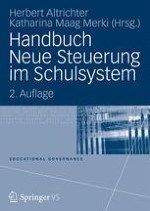2016 | OriginalPaper | Chapter
Entscheidungsfindung in Bildungspolitik und Bildungsverwaltung
Author : Kathrin Dedering
Published in: Handbuch Neue Steuerung im Schulsystem
Publisher: Springer Fachmedien Wiesbaden
Activate our intelligent search to find suitable subject content or patents.
Select sections of text to find matching patents with Artificial Intelligence. powered by
Select sections of text to find additional relevant content using AI-assisted search. powered by
